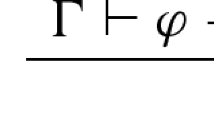Abstract
In standard model theory, deductions are not the things one models. But in general proof theory, in particular in categorial proof theory, one finds models of deductions, and the purpose here is to motivate a simple example of such models. This will be a model of deductions performed within an abstract context, where we do not have any particular logical constant, but something underlying all logical constants. In this context, deductions are represented by arrows in categories involved in a general adjoint situation. To motivate the notion of adjointness, one of the central notions of category theory, and of mathematics in general, it is first considered how some features of it occur in set-theoretical axioms and in the axioms of the lambda calculus. Next, it is explained how this notion arises in the context of deduction, where it characterizes logical constants. It is shown also how the categorial point of view suggests an analysis of propositional identity. The problem of propositional identity, i.e., the problem of identity of meaning for propositions, is no doubt a philosophical problem, but the spirit of the analysis proposed here will be rather mathematical. Finally, it is considered whether models of deductions can pretend to be a semantics. This question, which as so many questions having to do with meaning brings us to that wall that blocked linguists and philosophers during the whole of the twentieth century, is merely posed. At the very end, there is the example of a geometrical model of adjunction. Without pretending that it is a semantics, it is hoped that this model may prove illuminating and useful.
Similar content being viewed by others
References
S. R. Buss (1991) ArticleTitle‘The Undecidability of k-Provability’ Annals of Pure and Applied Logic. 53 75–102 Occurrence Handle10.1016/0168-0072(91)90059-U
A. Carbone (1997) ArticleTitle‘Interpolants, Cut Elimination and Flow Graphs for the Propositional Calculus’ Annals of Pure and Applied Logic. 83 249–299 Occurrence Handle10.1016/S0168-0072(96)00019-X
Dosen, K.: 1989, ‘Logical Constants as Punctuation Marks’, Notre Dame Journal of Formal Logic 30, 362–381 (slightly amended version in D.M. Gabbay (ed.), What is a Logical System?, Oxford University Press, Oxford, 1994, pp. 273–296).
K. Dosen (1996) ArticleTitle‘Deductive Completeness’ The Bulletin of Symbolic Logic. 2 243–283, 523 Occurrence Handle10.2307/420991
K. Dosen (1998) ArticleTitle‘Deductive Systems and Categories’ Publications de l’Institut Mathématique. 64 IssueID78 21–35
K. Dosen (1999) Cut-Elimination in Categories Kluwer Dordrecht
Dosen, K.: 2001, ‘Abstraction and Application in Adjunction’, in Z. Kadelburg (ed.), Proceedings of the Tenth Congress of Yugoslav Mathematicians, Faculty of Mathematics, University of Belgrade, pp. 33–46 (available at: http://xxx.lanl.gov/math.CT.0111061).
M. Dummett (1973) Frege: Philosophy of Language Duckworth London
S. Eilenberg G. M. Kelly (1966) ArticleTitle‘A Generalization of the Functorial Calculus’ Journal of Algebra. 3 366–375 Occurrence Handle10.1016/0021-8693(66)90006-8
H. Ishiguro (1990) Leibniz’s Philosophy of Logic and Language EditionNumber2 Cambridge University Press Cambridge
C. Kassel (1995) Quantum Groups Springer Berlin
L. H. Kauffman S. L. Lins (1994) Temperley–Lieb Recoupling Theory and Invariants of 3-Manifolds Princeton University Press Princeton
G. M. Kelly S. MacLane (1971) ArticleTitle‘Coherence in Closed Categories’ Journal of Pure and Applied Algebra. 1 97–140, 219 Occurrence Handle10.1016/0022-4049(71)90013-2
J. Lambek (1974) ArticleTitle‘Functional Completeness of Cartesian Categories’ Annals of Mathematical Logic. 6 259–292 Occurrence Handle10.1016/0003-4843(74)90003-5
J. Lambek (1999) ‘Type Grammars Revisited’ A. Lecomte (Eds) et al. Logical Aspects of Computational Linguistics Springer Berlin 1–27
J. Lambek P. J. Scott (1986) Introduction to Higher-Order Categorical Logic Cambridge University Press Cambridge
F. W. Lawvere (1969) ArticleTitle‘Adjointness in Foundations’ Dialectica. 23 281–296
Petrić, Z.: 1997, Equalities of Deductions in Categorial Proof Theory (in Serbian), Doctoral Dissertation, University of Belgrade.
D. Prawitz (1965) Natural Deduction: A Proof-Theoretical Study Almqvist and Wiksell Stockholm
Author information
Authors and Affiliations
Corresponding author
Additional information
*Since the text of this talk was written in 1999, the author has published several papers about related matters (see ‘Identity of proofs based on normalization and generality’, The Bulletin of Symbolic Logic 9 (2003), 477–503, corrected version available at: http://arXiv.org/math.LO/0208094; other titles are available in the same archive).
Rights and permissions
About this article
Cite this article
Dosen, K. Models of Deduction*. Synthese 148, 639–657 (2006). https://doi.org/10.1007/s11229-004-6290-7
Issue Date:
DOI: https://doi.org/10.1007/s11229-004-6290-7




